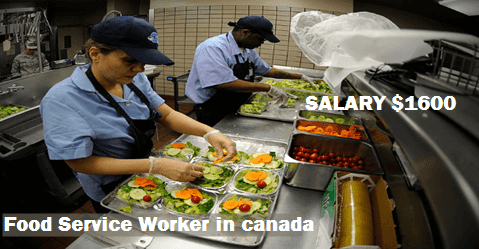The food service industry in Canada is a vibrant and thriving sector that offers a multitude of job opportunities for individuals, both domestic and international. With its diverse culinary landscape and growing demand for quality dining experiences, this industry presents a promising prospect for those seeking jobs in Canada.
For international candidates looking to pursue a career in the food service sector, the process can be facilitated through visa sponsorship provided by prospective employers. This avenue allows talented individuals from around the world to contribute their skills and expertise to Canada’s culinary scene.
However, to navigate the path to success in this industry, it is essential to have a comprehensive understanding of the job opportunities available, the specific skills required, the application process, and the immigration procedures involved.
In this blog post, we will delve into the diverse job opportunities within Canada’s food service industry, exploring the range of roles available and the skills that employers seek. Additionally, we will provide valuable guidance on the application process and highlight the immigration procedures that international candidates need to be aware of.
Whether you aspire to work as a chef, a server, a barista, or in any other food service position, this blog post will serve as a valuable resource, equipping you with the necessary information to pursue your career goals in Canada’s thriving food service industry.
Different Job Positions For Food Service Workers in Canada
The food service industry in Canada offers a diverse range of job positions that contribute to the smooth operation of restaurants, cafes, and various dining establishments. Each job title carries specific responsibilities and plays a vital role in delivering exceptional dining experiences to customers.
The duties of meal service staff differ relying on their particular job title. As an illustration, cooks put together meals, servers work together with clients and deal with orders, whereas dishwashers clear and keep the kitchen.
Regardless of the distinction in roles, all meal service staff contribute to the sleek operation of a restaurant, café, or different eating institutions.
- Cooks: Cooks are skilled professionals who prepare meals according to recipes and culinary standards. They handle ingredients, seasonings, and cooking techniques to create delicious and visually appealing dishes. Cooks ensure that food is cooked to perfection, paying attention to taste, presentation, and food safety guidelines.
- Servers: Servers are the face of the establishment, interacting directly with customers. They greet guests, provide menus, take orders, and offer recommendations based on customer preferences. Servers ensure that orders are accurate, deliver meals promptly, and address any customer inquiries or concerns. Their friendly and attentive service contributes to a positive dining experience.
- Dishwashers: Dishwashers play a crucial role in maintaining cleanliness and organization in the kitchen. They handle dishwashing equipment, clean dishes, cutlery, and utensils, and ensure they are properly sanitized for reuse. Dishwashers also assist in kitchen maintenance, such as sweeping floors, emptying trash, and restocking supplies.
- Bartenders: Bartenders specialize in preparing and serving beverages, including alcoholic and non-alcoholic drinks. They mix and create cocktails, take drink orders, and engage in conversation with customers. Bartenders possess knowledge of various drinks, including ingredients and proper serving techniques, to provide an enjoyable and memorable bar experience.
- Baristas: Baristas are skilled professionals who specialize in crafting and serving coffee and tea beverages. They operate coffee machines, grind beans, and create a variety of coffee-based drinks, such as lattes, cappuccinos, and espressos. Baristas ensure consistent quality and presentation of beverages while providing friendly customer service.
- Restaurant Managers: Restaurant managers oversee the overall operations of the establishment. They coordinate and manage staff, handle customer inquiries and complaints, ensure compliance with health and safety regulations, and oversee financial aspects such as budgeting, inventory management, and profitability. Restaurant managers play a crucial role in maintaining the smooth functioning of the business.
- Hosts/Hostesses: Hosts or hostesses are responsible for greeting and seating guests as they arrive at the restaurant. They manage reservations, organize seating arrangements, provide menus, and help create a welcoming atmosphere for customers. Hosts/Hostesses may also handle phone inquiries and assist with managing the flow of guests during peak hours.
- Sommeliers: Sommeliers are wine experts who assist customers in selecting and pairing wines with their meals. They possess in-depth knowledge of various wine regions, grape varieties, and flavor profiles. Sommeliers guide customers through the wine list, make recommendations, and enhance the overall dining experience by providing expertise on wine choices.
- Pastry Chefs/Bakers: Pastry chefs or bakers specialize in creating delicious desserts, pastries, and bread items. They possess advanced baking skills and knowledge of various baking techniques. Pastry chefs/bakers prepare and decorate cakes, create delectable pastries, and ensure the quality and consistency of baked goods.
- Food and Beverage Supervisors: Food and beverage supervisors oversee the service and quality of food and beverages within the establishment. They monitor staff performance, ensure adherence to standard operating procedures, address customer concerns, and maintain a high level of service. Food and beverage supervisors work closely with other staff members to ensure a seamless and enjoyable dining experience.
Benefits of Working in the Food Service Industry as a Foreign Worker
Working in the food service industry as a foreign worker in Canada brings several advantages and benefits. Here are some key benefits specific to foreign workers:
- Visa Sponsorship: Many employers in the food service industry are willing to sponsor work visas for foreign workers. This sponsorship facilitates legal authorization to work in Canada and provides an opportunity to gain valuable work experience in a foreign country.
- Cultural Exchange: Working in the food service industry allows foreign workers to immerse themselves in a multicultural environment. Interacting with customers and colleagues from diverse backgrounds provides a unique opportunity to learn about different cultures, traditions, and cuisines.
- Language Development: The food service industry provides an environment for foreign workers to improve their language skills, particularly English or French, depending on the region of Canada. Regular communication with customers and colleagues enhances language proficiency and fosters effective communication in a professional setting.
- Skill Enhancement: Working in the food service industry enables foreign workers to develop and enhance a range of transferable skills. These include customer service, communication, teamwork, adaptability, time management, problem-solving, and attention to detail. These skills can be valuable for future career opportunities both within and outside the industry.
- Networking and Connections: The food service industry offers opportunities to build professional networks and establish connections. Engaging with customers, colleagues, and industry professionals can lead to valuable relationships and potential career advancements or future job opportunities.
- Financial Stability: The food service industry often provides stable employment and a regular income. Foreign workers can support themselves financially and meet their living expenses while gaining work experience in Canada.
- Career Advancement: Working in the food service industry can be a stepping stone to broader career opportunities. Through dedication, hard work, and the acquisition of industry-specific skills, foreign workers may progress to higher positions or explore other roles within the hospitality and culinary sectors.
- Personal Growth: Working in a foreign country and experiencing a new culture can contribute to personal growth and self-confidence. It allows foreign workers to develop independence, resilience, adaptability, and a global mindset.
- Access to Social Benefits: In Canada, many employers in the food service industry offer employee benefits such as health insurance, retirement plans, paid vacation, and sick leave. These benefits contribute to the overall well-being and job satisfaction of foreign workers.
Visa Sponsorship and Immigration Procedures
If an employer decides to employ an international employee, they sometimes want to use it for a Labour Market Influence Evaluation (LMIA) from Employment and Social Growth Canada (ESDC).
The LMIA verifies that there’s a want for an international employee and that no Canadian employee is on the market to do the job. If the LMIA is authorized, the employer would ship a duplicate to the worker, who can then apply for a piece allowance.
When an employer in Canada intends to hire an international employee in the food service industry, they typically need to go through a process called the Labour Market Impact Assessment (LMIA) conducted by Employment and Social Development Canada (ESDC).
The purpose of the LMIA is to assess the labor market and determine if there is a genuine need for hiring an international worker, ensuring that no qualified Canadian worker is available for the job.
Would You Like To Apply For This Jobs/Sponsorship?
Enter Your Email Address HERE & You Will Receive a Notification About Your Application. If it shows "Subscribed" CLICK HERE to follow on Telegram for updatesDuring the LMIA process, the employer must demonstrate that hiring an international worker is necessary and justifiable based on specific criteria. This includes providing evidence of advertising the job position and conducting recruitment efforts to attract Canadian candidates.
The LMIA aims to safeguard the Canadian labor market by prioritizing employment opportunities for Canadian citizens and permanent residents.
If the LMIA application is approved by ESDC, the employer will receive a positive LMIA letter. The employer is then required to provide a copy of the LMIA letter to the prospective international employee. With this letter, the employee can proceed to apply for a work permit or work allowance, commonly known as a visa.
The employee must submit the necessary documentation, including the LMIA letter, along with their work permit application to Immigration, Refugees, and Citizenship Canada (IRCC). IRCC will assess the application based on the specific requirements and eligibility criteria for work permits.
If approved, the employee will be granted a work permit, allowing them to work in Canada under the sponsorship of the employer who obtained the LMIA.
It is important for both employers and employees to understand and adhere to the LMIA process and visa application requirements to ensure compliance with Canadian immigration regulations.
By following the necessary steps and obtaining the appropriate permits, employers can sponsor international workers, and employees can legally work in Canada’s food service industry.
Qualifications and Expertise Needed in the Food Service Industry in Canada
The food service industry in Canada requires individuals to possess a range of qualifications and expertise to excel in various roles. Whether entry-level positions or specialized culinary roles, certain skills, and knowledge are essential for success in the industry.
- Communication and Customer Service: Excellent communication abilities and strong customer service skills are necessary for all roles in the food service industry. Effective communication ensures clear interactions with customers, colleagues, and superiors, while exceptional customer service guarantees a positive dining experience. Attentiveness to customer needs, prompt responses to inquiries, and the ability to handle concerns or complaints professionally are vital attributes.
- Adaptability and Fast-Paced Environment: The food service industry operates in a fast-paced environment, requiring individuals to be adaptable and work efficiently under pressure. The ability to multitask, stay organized, and manage time effectively ensures smooth operations and customer satisfaction. Flexibility in scheduling, including availability for peak hours, weekends, and holidays, is often expected.
- Culinary Skills and Food Safety Knowledge: Specific positions, such as cooks or chefs, demand culinary abilities and meal safety expertise. Culinary skills include proficiency in cooking techniques, menu planning, and food presentation. Understanding and adhering to food safety regulations and guidelines is crucial to maintaining a safe and hygienic kitchen environment.
- Interpersonal Skills: Strong interpersonal skills enable effective collaboration and teamwork within the food service industry. Building positive relationships with colleagues and customers fosters a cooperative and friendly atmosphere, enhancing the overall dining experience.
- Attention to Detail: Attention to detail is vital in maintaining quality standards within the food service industry. Whether it’s food presentation, cleanliness, or following recipes accurately, a keen eye for detail ensures consistency and customer satisfaction.
By possessing these qualifications and expertise, individuals can thrive in the diverse and dynamic food service industry in Canada.
Whether pursuing entry-level positions or aspiring to become culinary professionals, a combination of communication skills, customer service excellence, adaptability, culinary proficiency, and attention to detail paves the way for success in this rewarding industry.
Final Points
Canada offers exciting opportunities for foreign individuals seeking employment in the food service industry. With visa sponsorship available, this sector provides a pathway for foreigners to work and thrive in Canada. Whether it’s as a waiter, chef, or kitchen staff, there are diverse roles available that cater to individuals with varying levels of experience.
By embracing the multicultural nature of its society, Canada values the contribution of foreign workers in its food service sector. With a robust job market and a strong emphasis on diversity, Canada’s food service industry provides an ideal platform for foreigners to showcase their skills and gain valuable experience.
It’s important for foreign individuals interested in food service jobs in Canada to research job opportunities, connect with relevant employers, and explore avenues for visa sponsorship. Utilizing resources like job search platforms and networking within the industry will enhance the chances of finding suitable employment.
As you embark on your journey to pursue food service jobs in Canada, remember to stay motivated, adaptable, and persistent. With determination and the support of visa sponsorship programs, you can take advantage of the thriving food service industry and build a fulfilling career in Canada.



![[Hotel Jobs🇬🇧] Workers Are Wanted In UK, Visa Sponsorships Available - Are You Interested? hotel jobs](https://hotcampusnews.com/wp-content/uploads/2023/07/hotel-jobs-150x150.jpg)



Good day,how to apply in canada.without hussle.even im poor life.but im strong to apply work canada.but im been already malaysia.as household worker.i want more experience any job.like food processong.fruit farm etc
My family economic condition is worrying. Please help me for my family’s progress and future. I know some things.can you please help me.